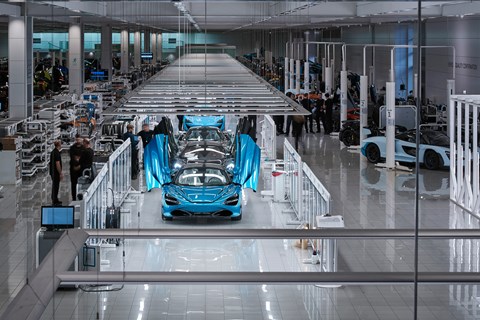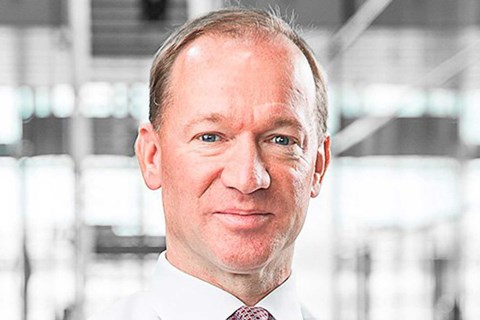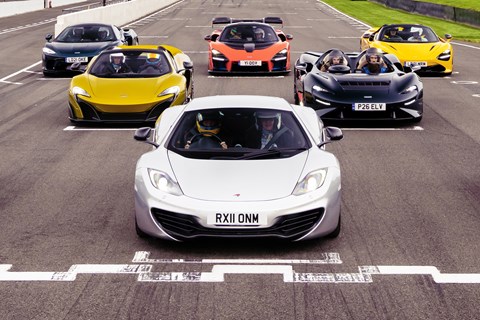► Audi and BMW vying for McLaren assets
► BMW wants the supercar division
► Audi and Porsche
As reported by CAR in 2021, Porsche and Audi had been on the verge of entering F1, and now Reuters reports it’s been confirmed by the VW CEO Herbert Deiss. What’s more, Deiss also suggested that Stuttgart’s plans to join Formula One were at a more advanced stage than Audi’s.
The move comes after months of rumours, and the reasoning behind it seems to have become relatively simple; joining F1 would bring in more money than it used. According too Diess, the entire process had created divisions within the VW Group, but when combined with the financial arguments – and the fact that both brands are as important as the Group’s chinese business – there was no other conclusion. ‘You just run out of arguments,’ Diess told Reuters.
Finally!
The latest intel suggested that Audi has contacted Mumtalakat, the Bahranian government’s sovereign wealth fund, and initially offered €450m to buy McLaren’s F1 division. But that sum has since increased to around €650m in order for the German brand to get access to the biggest motorsport in the business. The Bahranian state holding is said to have four weeks to reply to the offer.
Even so, Auto News Europe via Frankfurter Allgemeine Zeitung has quoted McLaren F1 team boss saying: ‘I am hearing they [Volkswagen] are going to do something with Red Bull on the Porsche front. I think they have spoken with a handful of people on the grid and as you would imagine we have had conversations but in the short term and medium term we are very happy where we are.’
The news comes not long after a new report from Reuters that suggests the VW board could give them green light later on in April 2022. ‘We will hopefully be able to communicate our intention to enter into Formula One then,’ one of the sources told Reuters, with a further source telling the outlet there was a ‘good chance’ of a positive decision.
Either way, the deal is now done.
How could it work?
The plan is now for Audi to team up with the McLaren motorsport division and also take over Woking’s automotive arm. It’ll be a one all-in parcel, racing and automotive, lock, stock and barrel. CAR understands the diligence phase has not yet begun, but the lawyers of both parties are already talking, and the main stakeholders – among them the Mumtalakat Holding Company from the Middle East – are allegedly willing to sell the loss-making car business.
In addition to a couple of new logos on the grid – which we’ll get to later – this will result in substantial economies of scale between Lambo, McLaren and Porsche. This would create the world’s strongest sports car group.

Audi and Porsche become engine suppliers
For a while, it was not clear whether Audi and Porsche would field two pairs of jointly developed F1 race cars or act merely as powertrain supplier. It now transpires that the latter option is about to materialize. While Audi would power with McLaren, Porsche is said to have an arrangement with Red Bull Racing in the works – potentially after the current period with Honda consultancy. There even exists a fallback Plan B: Audi & Williams and Porsche & Alpha Tauri or even Haas.
In some ways, this makes the most sense. Porsche and Audi get to develop and market their hybrid technology – in advance of the new rules – without the cost of chassis development.
What about the engine?
The new drivetrain is reportedly a joint effort by Audi Sport and Porsche Motorsport. Although the VW side had favoured an ultra high-performance 2.0litre four which was from the very beginning part of the so-called world engine project, the FIA opted for the 1.6litre V6 turbo which was a precondition for Ferrari to stay in F1.
Fed by sustainable fuels and devoid of the capricious MGU-H energy regeneration system, the combustion engine will in the future be supported by 475bhp of e-power – about triple the current output.
How would Audi benefit?
According to those in the know, Audi is bidding for McLaren Cars and for the F1 unit, said to be worth around £1 billion. Jörg Astalosch, 49, is the designated chief liaison officer in the Audi-McLaren talks. Previously in charge of Ital Design (also an Audi satellite), the former confidant of VW Group supremo Ferdinand Piech started his new job in October.
Audi and Porsche are likely to fuse the F1 R&D work while retaining different set-ups and visual identities. One scenario suggests that Audi/McLaren will partner with Porsche/Red Bull to fight Ferrari and Mercedes in the upcoming hybrid/sustainable fuels era.
This could be a profitable enterprise for Audi and Volkswagen Group. Mercedes CEO Ola Källenius revealed last year that the AMG Petronas F1 commitment creates an annual media value of $1.5bn – and rising. Since Audi has pulled out of DTM and Formula E, the return on investment looks potentially sound.

Is McLaren vulnerable to a takeover?
McLaren has suffered a torrid time due to Covid-19. The Automotive division recorded a £222.9million operating loss in 2020, a swing from £91.1m profit in 2019. Last year, sales crashed by 64 per cent to 1659 cars.
McLaren had to make some 830 redundancies. And the group has been involved in a critical refinancing, selling the Woking HQ and leasing it back, and issuing £550m of new shares to provide liquidity and pay off a £150m loan.
The situation has improved in 2021, with revenue doubling in the first half of the year. However McLaren Automotive CEO Mike Flewitt (below) stood down in late October, after eight years in charge. One of his final acts was to start evolving the Track25 strategy, which proposed the launch of 18 new models in a six-year timeframe, into a plan called Horizon 2030. This is likely to slow down the pace of new derivatives, in favour of higher margin models and an electrification push.

Two former Volkswagen Group executives – both appointed McLaren Group non-executive directors in early October – will steer Automotive for an interim period. They are former Porsche CEO Michael Macht, who will run the technical and operations side, and Stefan Jacoby, who also worked at GM and Mitsubishi.
What about BMW?
BMW was previously in the race to buy McLaren, but that has now gone cold. A key player is Mumtalakat, the Bahrain state investment fund which owns about 42 per cent of McLaren. Reportedly Mumtalakat had its first, on-the-record meeting with BMW in early December. It appears that didn’t come to anything of note.

BMW has had ties with McLaren since providing the iconic F1 supercar’s V12 in the ‘90s. A few years back, the two companies had talks about McLaren collaborating on a mid-engined supercar for Munich, but the project never got off the ground.
For BMW, acquiring McLaren would’ve kicked the door to supercar heaven wide open. And BMW could do with a new sports car plan, because the cupboard is bare. The M8 is an overweight GT, the Z4 wouldn’t exist without Toyota and brand-shaping halo cars like Z8 or i8 are history.
But surely VW has too many sports car brands?
Rumours suggest Volkswagen Group has considered divesting brands including Lamborghini and Ducati; CAR’s Georg Kacher broke the story of Bugatti being spun-off to Croatian EV pioneer Rimac. So why bid for McLaren?
While the F1 connection is self-explanatory, an Ingolstadt source revealed, there are logical reasons to acquire McLaren Automotive. One is defensive: to block rivals from Korea or China – Geely reportedly was in talks with McLaren Cars last year – or arch-rival BMW.
In the long run McLaren could end up in sync with Bentley and Lambo to boost synergy effects in a profitable but increasingly volatile market. And in a single decade, McLaren has raced from nowhere to matching Ferrari and Lamborghini in ability and desirability – and there are admirers within the group who fancy driving it forward themselves.
It’s not the first time BMW and VW Group have gone head-to-head for a blue-chip British car maker. In the late ’90s both sought the then-combined Rolls-Royce and Bentley – with BMW ultimately getting the Spirit of Ecstasy and VW the Winged B.